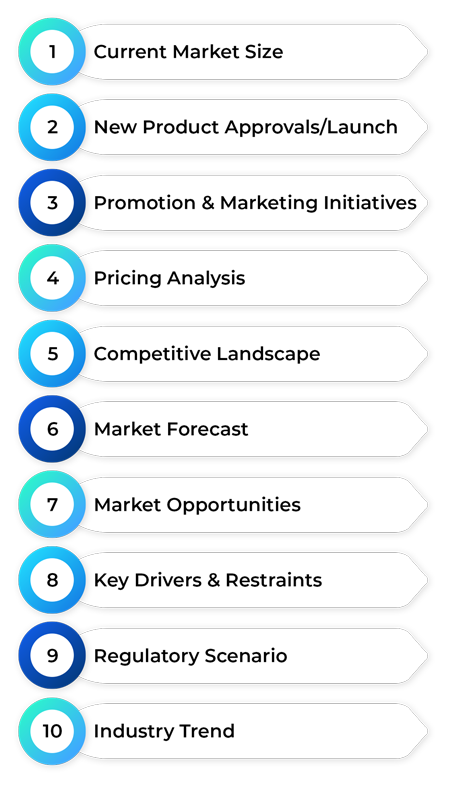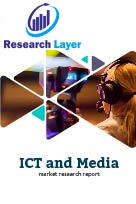 +1 915 229 3004 (U.S.) |
+1 915 229 3004 (U.S.) |  +44 7452 242832 (U.K.)
+44 7452 242832 (U.K.)
 +1 915 229 3004 (U.S.) |
+1 915 229 3004 (U.S.) |  +44 7452 242832 (U.K.)
+44 7452 242832 (U.K.)

The Artificial Intelligence in Healthcare (AI) Market Size was valued at USD 0.76 Billion in 2023 and is projected to grow from USD 1.13825 Billion in 2024 to USD 21.53 Billion by 2032, displaying a compound annual growth rate (CAGR) of probably 44.40% throughout 2024 - 2032. Growing patient health-related digital information datasets, expanding desire for personalized treatment, and rising demand to reduce care expenses are the key market drivers enhancing the AI in Healthcare Market growth.
Download Free Sample to learn more about this report
Rapid digitization of the healthcare sector is driving the AI in healthcare market growth. Market CAGR for healthcare artificial intelligence is driven by the ongoing digitization of healthcare. The market's growth will probably be fueled by rising expenditures made in artificial intelligence (AI) in healthcare by pharmaceutical and MedTech companies to improve their businesses. According to research from PwC, artificial intelligence is effective, rapid, and executes operational tasks for a significantly lower cost. The AI aids doctors in the early detection and diagnosis of any ailment. The expanding use of precision medicine, the rising value of big data in healthcare, the rising need to keep healthcare expenditures to a minimum, and falling hardware costs are all elements that are propelling expansion. Microsoft Corporation bought Nuance Communications, Inc. in April 2021. This acquisition helped the business integrate Nuance Communications' cutting-edge cloud and A/capabilities and their knowledge of the healthcare sector.
Additionally, the growing healthcare personnel scarcity sparked the use of AI/ML technology. It is now possible to train AI algorithms to analyze patient health data, enabling medical personnel to identify patients' illnesses and create efficient treatment programs. The ongoing Covid-19 pandemic, growing numbers of mergers and acquisitions, technical partnerships, and supportive government initiatives all played a vital part in advancing the application of AI in healthcare. Following their initial deployment in detecting Covid-19 positive individuals utilizing individualized patient information and data consolidation, AI/ML algorithms are now widely used in the quick and accurate diagnosis of medical problems. Thus, driving the Healthcare Artificial Intelligence Market revenue.
The Healthcare Artificial Intelligence Market Segments based on components, includes hardware, software, and services. The software segment acquired a major market share, accounting for 51.6% of market revenue (0.3 Billion). The rise of AI-based technologies in several healthcare applications, including cybersecurity, clinical trials, virtual assistants, robot-assisted surgeries, telemedicine, dose error reduction, and fraud detection, is responsible for this rapid growth rate. A smaller CAGR is predicted for the services segment during the forecast period. Services like virtual nursing support, which help to continuously monitor the patient's symptoms with physician comments on demand, are assisting in the segment's expansion.
The Healthcare Artificial Intelligence Market segmentation, based on application, includes robot-assisted surgery, virtual nursing assistant, dosage error reduction, clinical trial, preliminary diagnosis, and automated image diagnosis. Due to a boom in technical improvements in the category, the robot-assisted surgery segment had the highest market share and was in complete control of the market in 2022.
October 2021: Medtronic has acquired CE Mark approval for the Hugo robotic-assisted surgery (RAS) system to be utilized in general surgical procedures in Europe. Hugo RAS acquired CE Mark in October 2021 for urologic and gynecologic treatments. Together with general surgery, these indications account for over 80.1% of all robotic-assisted procedures performed globally.
The preliminary diagnostics market is also anticipated to expand significantly with a significant CAGR throughout the forecast period. AI-based pathology tools have become more popular due to the success of AI-based diagnostics tools.
The Healthcare Artificial Intelligence Market segmentation, based on technology, includes machine learning, querying method, and natural language processing. In 2022, the machine learning segment dominated the market. Machine learning is helpful for healthcare applications like detecting early indications of sickness or optimizing drug discovery through imaging data because it enables computers to learn from enormous volumes of data rather than following a specified set of instructions. Additionally, in 2022, the natural language processing segment witnessed the fastest growth rate. Computers can now scan unstructured records like doctor notes, translate them into structured data, and then display that information to healthcare professionals to help them make decisions more rapidly, thanks to the growing usage of natural language processing in EHRs.
The AI in Healthcare Market segmentation, based on end-user, includes pharmaceutical & biotechnology companies, hospital & diagnostic centers, and academic & research laboratories. In 2022, the hospitals & clinics sector had the largest share of the market. This category is expanding due to the rising use of new technologies in these environments and the growing level of industry-wide cooperation. During the projected time frame, the pharmaceutical and biotechnology firms category is anticipated to grow at a considerable CAGR. In healthcare, artificial intelligence (AI) forecasts pharmaceutical items' therapeutic efficacy and safety and assists in gene sequencing work.
Download Free Sample to learn more about this report
By region, the study provides market insights into North America, Europe, Asia-Pacific and Rest of the World. The North American Healthcare Artificial Intelligence Market area will dominate this market. The regional market will expand due to the increased acceptance of innovative AI-based medical devices and the efforts of significant industry players to obtain regulatory authority approval. Additionally, the rise in the quantity of Machine Learning (ML) based clinical trials, which produce outcomes with higher accuracy and shorter study intervals, will probably support the expansion of the market in the area.
Further, the major countries studied in the market report are US, Canada, France, German, Italy, UK, Spain, Japan, China, Australia, India, South Korea, and Brazil.
Europe's AI in Healthcare Market accounts for the second-largest market share due to advancements in the medication discovery process that streamline administrative processes and provide patients with effective healthcare. Additionally, using AI to streamline processes in the region's healthcare delivery system helped the market expand. Further, the German market of Artificial Intelligence in Healthcare held the major market share, and the UK market of Artificial Intelligence in Healthcare was the fastest-growing market in the European region.
The Asia-Pacific AI in Healthcare Market is estimated to expand at a rapid rate from 2024 -2032. Increasing expenditures in AI-based medical devices for diagnosing various ailments are anticipated to fuel market expansion in the area over the forecast year. For instance, CytoReason and Summit Pharmaceuticals (SPI) partnered in September 2021 to enter the Japanese market and create a computational illness model using AI. Moreover, China’s market of Artificial Intelligence in Healthcare held the largest market share, and the Indian market of Artificial Intelligence in Healthcare was the fastest-growing market in the Asia-Pacific region.
Leading market players are largely investing heavily in research and development to expand their product lines, which will help the Healthcare Artificial Intelligence Market, grow even more. The launch of new products, larger-scale mergers and acquisitions, contractual agreements, and collaboration with other organizations are significant market developments in which market participants engage to increase their presence. The AI in Healthcare Market must provide affordable products to expand and thrive in a more competitive and challenging market environment.
One of the major business strategies manufacturers use in the Artificial Intelligence in Healthcare industry to increase the market sector and benefits customers is local manufacturing to lower operational costs. In recent years, the Artificial Intelligence in Healthcare industry has stipulated some of the most important medicinal benefits. Major players in the Artificial Intelligence in Healthcare Market, including Recursion Pharmaceuticals, Medtronic, CloudmedX, Oncora Medical, Google, and others, are funding operations for research and development to boost market demand.
Nvidia is the leading manufacturer of discrete graphics processing units, which improve the user experience on computing platforms. The company's chips are used in various applications, including PC gaming and data centers. Over 1,800 healthcare businesses are supported by the NVIDIA Inception program, which fosters the development of cutting-edge, GPU-based applications to optimize operations, improve diagnostics, and elevate patient care. In March 2022, NVIDIA announced Clara Holoscan MGXTM, a platform designed to satisfy regulatory standards for the medical device sector to create and deploy real-time AI applications at the edge. Clara Holoscan MGX extends the Clara Holoscan platform to deliver an all-in-one, medical-grade reference architecture and long-term software support to speed medical device creation.Top of Form
September 2023, Merck entered into two strategic collaborations with Exscientia and BenevolentAI to strengthen their drug development capabilities using AI. They are going to focus specifically to develop candidates for immunology, neurology, and oncology drug candidates.
November 2023, Wipro partner with NVIDIA to expedite adoption of AI among healthcare companies. The collaboration is expected to augment Medicare, Medicaid, and other platforms with the help of AI.
October 2023, ZS launch ZAIDYN Connected Health solution that will enable biopharmaceutical companies, healthcare providers and payers to gain health insights, provide patient engagement, and perform connected research with the help of AI.
· Hardware
· Software
· Services
· Robot-Assisted Surgery
· Virtual Nursing Assistant
· Dosage Error Reduction
· Clinical Trial
· Preliminary Diagnosis
· Automated Image Diagnosis
· Machine Learning
· Querying Method
· Natural Language Processing
· Pharmaceutical & Biotechnology Companies
· Hospital & Diagnostic Centers
· Academic & Research Laboratories
· North America
o US
o Canada
· Europe
o Germany
o France
o UK
o Italy
o Spain
o Rest of Europe
· Asia-Pacific
o China
o Japan
o India
o Australia
o South Korea
o Australia
o Rest of Asia-Pacific
· Rest of the World
o Middle East
o Africa
o Latin America
Report Scope
|
Report Attribute/Metric |
Details |
|
Market Material 2022 |
USD 0.76 Billion |
|
Market Material 2023 |
USD 1.13825 Billion |
|
Market Material 2032 |
USD 21.53 Billion |
|
Compound Annual Growth Rate (CAGR) |
44.40% (2023-2032) |
|
Base Year |
2022 |
|
Market Forecast Period |
2023-2032 |
|
Historical Data |
2018- 2022 |
|
Market Forecast Units |
Value (USD Billion) |
|
Report Coverage |
Revenue Forecast, Market Competitive Landscape, Growth Factors, and Trends |
|
Segments Covered |
Type, Material, Sales Channel, and Region |
|
Geographies Covered |
North America, Europe, Asia Pacific, and the Rest of the World |
|
Countries Covered |
The U.S., Canada, German, France, U.K, Italy, Spain, China, Japan, India, Australia, South Korea, and Brazil |
|
Key Companies Profiled |
Recursion Pharmaceuticals, Medtronic, CloudmedX, Oncora Medical, Google, and others, are funding operations for research and development to boost market demand |
|
Key Market Opportunities |
The rising focus of vendors on comfort-enhancing products |
The Artificial Intelligence in Healthcare (AI) Market Size was valued at USD 0.76 Billion in 2023 and is projected to grow from USD 1.13825 Billion in 2024 to USD 21.53 Billion by 2032
The global market is projected to grow at a CAGR of 44.40% during the forecast period, 2023-2032.


Research on the market is done by industry professionals who provide personalized insights on the industry structure, market segmentation, Type assessment, competitive landscape (CL), along with penetration, and emerging trends. In addition to years of professional experience in their various fields and sectors, their analysis is largely based on primary interview (60%) and secondary research (40%) as well as years of professional experience. In addition, our researchers forecast the market's direction over the following seven years by examining past trends and the market's current position. Additionally, various trends of segments and categories that are geographically portrayed are studied and estimated using primary and secondary research.
The key level executives (VP, CEO, Marketing Directors, and Business Development Managers) of the major industry participants who are active and prominent as well as mid-scale businesses operating in this market were interviewed in-depth for this supply-side report by overall Global Market Research.
Extensive primary research was conducted to gain a deeper grasp of the market and industry. Both primary and secondary research, as well as years of pertinent professional experience, are used to support the analysis. By analyzing past and present market patterns, our experts were able to forecast the market's course over the following seven years. For the geographically offered categories in the list of market tables, it differs per category. In connection with the Global Market research report, we also conducted a number of primary interviews with senior level executives (VP, CEO's, Directors, Marketing Directors, Business Development Managers, CFOs, Technical Consultants, Key Opinion Leaders, Industry Experts, Decision Matrix Authorities, and other crucial individuals) of the key industry players who dominated the Global market.
The primary purpose of secondary research was to gather, identify, and validate the information necessary for the thorough, technical, market-focused, and commercial analysis of the global market. With the use of this study, it was also possible to classify and segment the market in accordance with market trends, geographic markets, and regional considerations linked to market type. Analysts have gathered data in the Distribution Channel for the study of the market from reliable sources including annual reports, journals, white papers, corporate presentations, company websites, international organizations of Energy and Power manufacturers, credible paid databases, and many others to gather reliable intel.
Both top-down and bottom-up methodologies were employed to assess the accuracy of the global market size. The market for as a whole was estimated using these methods for a number of different dependent submarkets. Secondary research was used to address the major industry players, and primary and secondary research was used to calculate their market shares in the various regions. This complete intellectual process includes reading the annual and financial reports of the top market participants and conducting in-depth interviews with top industry executives (VP, CEO, Marketing Directors, and Business Development Managers) to gain important industry insights.
Through reliable secondary sources and validated primary sources, the classification of the global markets and their geographic percentage splits were established. To obtain the final qualitative and quantitative data, all relevant variables that might have an impact on the market under investigation have been taken into consideration, inspected in great depth, verified through primary research, and assessed. This information was collected, added to, and thoroughly examined by professional analysts before being provided in this report. The process used to estimate the overall market size for this study is depicted in the following image as an example.


Report Code :
RL65648
Published on :
July 2024
Request a Free Sample Report